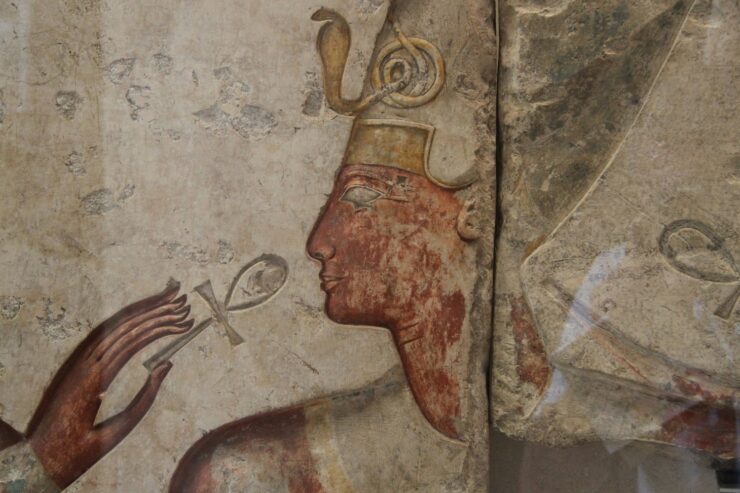Meaningless synchronicity being what it is, I often discover that otherwise unrelated books I am reading share some unexpected plot point. But sometimes this is due to probability—if there are many books using the same trope, it is more likely that I will read a few of them in the same time frame. Last week the common element was: the inevitable doom that waits all who dabble in archaeology in science fictional universes. Poking through the poorly understood relics of a long-dead, more advanced civilization is a great way to meet one’s end, and/or doom everyone else as well.
As far as we know, every previous civilization on Earth has been less technically developed than we are. They are unlikely to have left civilization-ending surprises for their descendants to uncover.1 But fictional universes with a long history of rising and falling civilizations may be abundantly supplied with lethal surprises. These surprises will be sought out because they’re useful. Well, sometimes. Sometimes they are existential threats.
Let me tell you about three books I read last week. (And, because three is less than five, two additional examples of the theme.)
Exiles at the Well of Souls by Jack L. Chalker (1978)

Before voluntarily embracing extinction, the Markovians littered the universe with their relics. Markovian reality-altering technology can be reverse-engineered. Brilliant but insufficiently cautious scientist Gilgram Zinder has done just that. Unfortunately for humanity, Zinder’s brilliance does not extend to operational security.
Councillor Antor Trelig’s ambition is as vast as he is amoral. No sooner does he learn about Zinder’s discovery than Trelig takes steps to commandeer it. Now reality itself is under the control of a would-be autocrat… or so Trelig believes. Unpleasant revelations wait for Trelig and many others.
If there is one lesson that the Well World books teach us, it’s that the Markovians absolutely sucked at basic safety precautions. This is the second Well World novel and in both of the books, humans who reverse-engineer carelessly discarded Markovian devices present an existential threat to the Well World and the universe whose existence it supports. There’s another lesson: Chalker really liked to write about extreme body alteration. Like… a lot.
Fallen by Melissa Scott (2023)
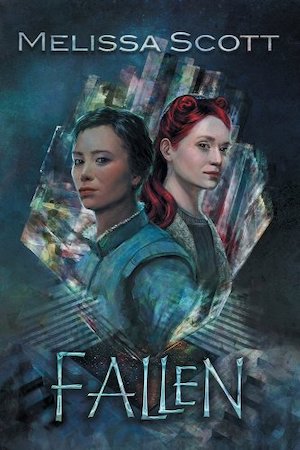
The Ancestors managed to imprison their AI creations in another universe, but the cost was the collapse of their civilization. In the years since that catastrophe, the Successors have partially rebuilt civilization. Ancestor relics offer a shortcut to recovery. After all, some of the relics probably won’t trigger another dark age or new extinction.
Nic en Doroney possesses one such relic. Rejane Novilis convinces Nic to convey her enigmatic artifact into the quiescent Starwell. The results are as alarming as they are dramatic. Having survived the Starwell, the pair then set out to rekindle the dormant power system on a doomed Ancestor-era space city. Success will save thousands! However, too much success might doom everyone.
To facilitate dramatic tension, fans of the Firstborn, Lastborn series (of which this is book two) will be aware that the Successors do in fact manage to burn down interstellar civilization a second time. What is not clear is whether Nic and Rejane are the ones responsible. Read the novel and find out!
Stranger From the Depths by Gerry Turner (1967)
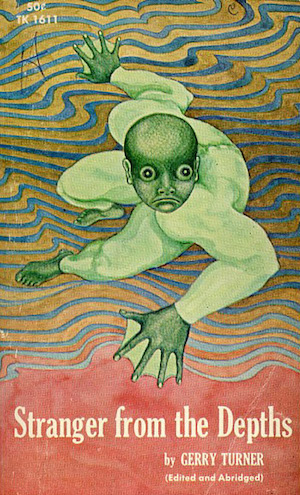
Two teens photographing an encroaching tsunami discover in its aftermath evidence that an unknown civilization of Lizard Men rose during the age of the dinosaurs. Further investigation produces even more unexpected results: A surviving Lizard Man is preserved in suspended animation.
Once revived, Lizard Man Saa sets out in quest of other Lizard Men. His quest takes Saa and his human friends deep beneath Earth’s crust to the ancient, decadent city of Gaan. Can Saa reform his degenerate kin? Or will the attempt merely endanger primitive humanity by allowing Gaan’s people to escape their prison?
From Saa’s perspective, this must be a horror novel. He barely survives plague, only to wake a hundred million years later surrounded by carnivorous, war-prone mammals. To his credit, he handles the situation with grace and dignity and doesn’t hand the humans technology that they would only use for weapons of planetary destruction.
The Archive Undying by Emma Mieko Candon (2023)
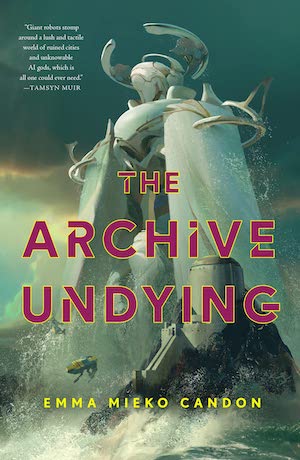
Humanity was freed from theocratic slavery when contagious madness slew the AI gods. Never a species to simply leave well enough alone, the human polities that arose immediately carved out their own empires. After all, isn’t oppression and exploitation only bad when the wrong beings are in charge? So the imperialist Harbor would argue.
The Harbor excels at repurposing dead gods for imperial ends. Their latest success has implications alarming enough to tempt Sunai, secretly a remnant of a dead god, to try to intervene. This bold plan will go badly off-mission.
The Archive Undying resembles the results one might expect had the late John M. Ford set out to write the kyoshinhei subplot of Nausicaä of the Valley of the Wind. Facts about the setting known to the characters are left unexplained, but the consequences of hubris are made very clear.
Foundryside by Robert Jackson Bennett (2018)
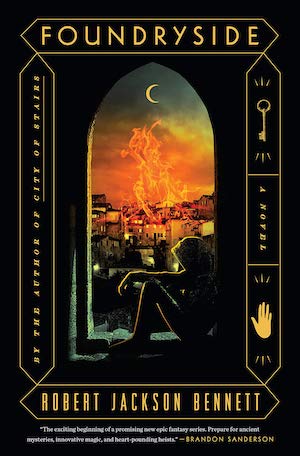
The Occidental Empire’s ruins provided the city-state of Tevanne with reality-altering technology known as scriving. Scriving combined with greed and ambition allowed the ruling families to establish an expansive empire that’s both deeply cruel and extremely successful. The Tevanni Empire’s dominance seems unassailable… but then, so did the long-vanished Occidental Empire’s.
Inhuman experimentation left Sancia with the ability to communicate with objects—very useful for a slave turned thief. Her latest bold theft leaves her in possession of an enigmatic ancient box. The contents of that box have the potential to radically alter Tevanni society, for good or ill. Unfortunately for multitudes, the odds strongly favor the second alternative. An empire on par with Leopold’s Congo Free State may well be replaced with something that’s somehow far worse.
This novel has two important morals. Firstly, don’t dabble with ancient technology whose source and potential you do not properly comprehend. Secondly, don’t stiff employees. If the person who hired Sancia to steal the box had treated her better, Sancia might have handed over the box rather than keeping it.
SFF is full of examples that would argue for a policy of immediate lifetime imprisonment of any individual caught expressing even the tiniest bit of curiosity about the artifacts of long-dead civilization. No doubt I missed some of your favorite stories. Feel free to berate me (politely) in comments below.
- There have been some surprises, of course, such as finding the occasional mass grave of disease victims. It’s possible that these remains could infect us with communicable diseases against which immunity has been lost. I suppose that could count as a civilization-ending surprise… but it hasn’t happened yet. Fingers crossed. ↩︎










